TheGita Gujarati – Chapter – 8
Chapter – 8 – Shloka – 1
Arjuna asked the Lord:
Dear Krishna, I have often encountered the terms Brahman, Adhyatma, Karma, Adhibhutam and Adhidaivam, yet I fail to understand the true meaning of these.
अर्जुन ने कहा —- हे पुरुषोत्तम ! वह ब्रह्म क्या है ? अध्यात्म क्या है ? कर्म क्या है ? अधिभूत नाम से क्या कहा गया है और अधिदैव किस को कहते हैं ।। १ ।।
Arjuna continued:
Furthermore, O Krishna, I am puzzld by the Adhiyoga. Who is he? How does he dwell in one’s body? Lastly, dear Lord, how do true Yogis come to know you in the ultimate end.
हे मधुसूदन ! यहाँ अधियज्ञ कौन है ? और वह इस शरीर में कैसे है ? तथा युक्त्त चित्त वाले पुरुषों द्वारा अन्त समय में आप किस प्रकार जानने में आते हैं ।। २ ।।
The Lord replied:
Dear Arjuna, always remember that Brahma is the Supreme imperishable (everlasting); the Universal Soul. The Jeevatma or the soul within one’s body is known as Adhyatma.
Karma is the offering made to the Gods that causes the creation or manifestation and also the preservation or sustenance of beings.
श्रीभगवान् ने कहा — परम अक्षर ‘ब्रह्म’ है, अपना स्वरूप अर्थात् जीवात्मा ‘अध्यात्म’ नाम से कहा जाता है तथा भूतों के भाव को उत्पन्न करने वाला जो त्याग है, वह ‘कर्म’ नाम से कहा गया है ।। ३ ।।
The Lord further explained:
Adhibhutam represents all perishable or temporary objects. Brahma, the Universal Soul is the Adhidaivam. O Arjuna, I the Vasudeva, am Adhiyga here in this body and form.
उत्त्पति-विनाश धर्म वाले सब पदार्थ अधिभूत हैं, हिरण्यमय पुरुष अधिदैव है और हे देहधारियों में श्रेष्ठ अर्जुन ! इस शरीर में मैं वासुदेव ही अन्तर्यामी रूप से अधियज्ञ हूँ ।। ४ ।।
Lord Krishna solemnly proclaimed:
O Arjuna, he who thinks only of Me at the time of his death, undoubtedly will come to Me.
जो पुरुष अन्तकाल में भी मुझको ही स्मरण करता हुआ शरीर को त्याग कर जाता है, वह मेरे साक्षात् स्वरूप को प्राप्त होता है —- इसमें कुछ भी संशय नहीं है ।। ५ ।।
O Arjuna, whatever entity (being or object) one thinks about during the time of his death while leaving his body, that is what he shall become in his next life.
हे कुन्ती पुत्र अर्जुन ! यह मनुष्य अन्तकाल में जिस-जिस भी भाव को स्मरण करता हुआ शरीर का त्याग करता है, उस-उस को ही प्राप्त होता है, क्योंकि वह सदा उसी भाव से भावित रहा है ।। ६ ।।
Therefore,O Arjuna, think of Me at all times, even while you fight this battle. If you surrender your mind and intellect to Me, dear friend, you will undoubtedly come to Me and unite with Me in heaven.
इसलिये हे अर्जुन ! तू सब समय में निरन्तर मेरा स्मरण कर और युद्ध भी कर । इस प्रकार मुझ में अर्पण किये हुए मन बुद्भि से युक्त्त होकर तू नि:संदेह मुझको ही प्राप्त होगा ।। ७ ।।
Arjuna, one who is constantly performing meditation upon God without letting his mind wander in any other direction, achieves supreme salvation (union with God)
हे पार्थ ! यह नियम है कि परमेश्वर के ध्यान के अभ्यास रूप योग से युक्त्त, दूसरी ओर न जाने वाले चित्त से निरन्तर चिन्तन करता हुआ मनुष्य परम प्रकाश रूप दिव्य पुरुष को अर्थात् परमेश्वर को ही प्राप्त होता है ।।
Dear Arjuna, one who is constantly fixed in meditation upon God, who is the omniscient (everywhere), omnipotent (ever-powerful), infinite (never-ending) ruler over all being, preserver of everybody, whose form cannot be conceived readily by any being, who is as brilliant as the Sun, and who is beyond the darkness of ignorance.
जो पुरुष सर्वज्ञ, अनादि, सबके नियन्ता*, सूक्ष्म से भी अति सूक्ष्म, सबके धारण-पोषण करने वाले, अचिन्त्य स्वरूप, सूर्य के सदृश नित्य चेतन प्रकाश रूप और अविद्या से परे, शुद्भ सच्चिदानन्दधन परमेश्वर का स्मरण करता है ।। ९ ।।
The Lord Continued:
That devoted person, at time of death, with a controlled mind, full of devotion to God, by the power of Yoga, fixing his last few breath in his life in between his eyebrows, only remembering the Supreme God, obtains God, the Supreme Divine Being.
वह भक्त्ति युक्त्त पुरुष अन्त काल में भी योग बल से भृकुटी के मध्य में प्राण को अच्छी प्रकार स्थापित करके फिर निश्चल मन से स्मरण करता हुआ उस दिव्य रूप परम पुरुष परमात्मा को ही प्राप्त होता हैं ।। १० ।।
The Blessed Lord Spoke:
O Arjuna, that which the scholars of the Vedas (those who study and are knowledgeable of the Vedas), who are self-controlled and passion-free. enter into, leading the life of celibacy and detachment from all things and being, this Supreme Being shall be made clear to you briefly.
वेद के जानने वाले विद्बान जिस सच्चिदानन्दधन रूप परम पद को अविनाशी कहते हैं, आसक्त्तिरहित यत्नशील संन्यासी महात्मा जन जिसमें प्रवेश करते हैं और जिस परम पद को चाहने वाले ब्रह्मचारी लोग ब्रह्मचर्य का आचरण करते हैं, उस परम पद को मैं तेरे लिये संक्षेप से कहूँगा ।। ११ ।।
When a Yogi has fully controlled all of his senses, fixes his mind in the heart, concentrates on nothing but God, concentrates all of his life’s breath in his head, fully establishes his being in the practice of Yoga.
Just as one is about to leave his body, he should chant “Om” as one of God’s many names, thinking of Me(the Lord) in the last few moments of his life. This is the key to the attainment of the Supreme state known as salvation.
सब इन्द्रियों के द्वारों को रोक कर तथा मन को ह्रध्शे में स्थिर करके, फिर उस जीते हुए मन के द्वारा प्राण को मस्तक में स्थापित करके, परमात्मा सम्बन्धी योग धारणा में स्थित होकर जो पुरुष ‘ओउम्’ इस एक अक्षर रूप ब्रह्म को उच्चारण करता हुआ और उसके अर्थ स्वरूप मुझ निर्गुण ब्रह्म का चिन्तन करता हुआ शरीर को त्याग कर जाता हैं, वह पुरुष परम गति को प्राप्त होता है ।। १२ – १३ ।।
O Arjuna, the Yogi who is established in Me, with his mind constantly fixed on Me, continually remembering Me, can easily attain me.
हे अर्जुन ! जो पुरुष मुझ में अनन्य-चित्त होकर सदा ही निरन्तर मुझ पुरुषोत्तम को स्मरण करता है, उस नित्य-निरन्तर मुझ में युक्त्त हुए योगी के लिये मैं सुलभ हूँ, अर्थात् उसे सहज ही प्राप्त हो जाता हूँ ।। १४ ।।
O Arjuna, the great sages (wise men,Yogis) having achieved Supreme perfection in their life, come to Me, and do not take rebirth which is temporary and full of suffering.
परम सिद्भि को प्राप्त महात्मा जन मुझको प्राप्त होकर दुःखों के घर एवं क्षणभंगुर पुनर्जन्म को नहीं प्राप्त होते ।। १५ ।।
All the worlds in the universe, including this one, O Arjuna, are subject to appear and disappear, go and return again, to be created and recreated, but, Arjuna, when one has attained Me, he is never born again into this world of suffering and temporary pleasure.
हे अर्जुन ! ब्रह्मलोकपर्यन्त सब लोक पुनरावर्ती हैं, परन्तु हे कुन्ती पुत्र ! मुझको प्राप्त होकर पुनर्जन्म नहीं होता ; क्योंकि मैं कालातीत हूँ और ये सब ब्रह्मादि के लोक काल के द्वारा सीमित होने से अनित्य हैं ।। १६ ।।
Those who knows that Brahma’s (the Supreme Creator) one day lasts 1,000 yugas and one night ends 1,000 yugus, truly know the essence of time.
ब्रह्मा का जो एक दिन है, उसको एक हजार चतुर्युगीतक की अवधि वाला और रात्रि को भी एक हजार चतुर्युगीतक की अवधि वाली जो पुरुष तत्त्व से जानते हैं, वे योगी जन काल के तत्त्व को जानने वाले हैं ।। १७ ।।
Dear Arjuna, try to understand that all that is visible in this world comes out from within Brahma (Creator of the world) at the start of his day.
At the start of Brahma’s night, all that is visible in this world goes back in Brahma.
सम्पूर्ण चराचर भूत गण ब्रह्मा के दिन के प्रवेश काल में अव्यक्त्त से अर्थात् ब्रह्मा के सूक्ष्म शरीर से उत्पन्न होते हैं और ब्रह्मा की रात्रि के प्रवेश काल में उस अव्यक्त्त नामक ब्रह्मा के सूक्ष्म शरीर में ही लीन हो जाते हैं ।। १८ ।।
O Arjuna, all beings in this world, by the force of their nature, are born again and again, and dissolve repeatedly as well. They perish and join Brahma at the start of his night, and are born again at the start of his day.
हे पार्थ ! यही यह भूत समुदाय उत्पन्न हो-होकर प्रकृति के वश में हुआ रात्रि के प्रवेश काल में लीन होता है और दिन के प्रवेश काल में फिर उत्पन्न होता है ।। १९ ।।
O Arjuna, one should always remember that there is a path that leads out of this cycle and into a world of eternal unmanifest, where one is never subject to being born, destroyed and reborn again.
It is a world of immortality in which one lives forever in peace and eternal happiness.
उस अव्यक्त्त से भी अति परे दूसरा अर्थात् विलक्षण जो सनातन अव्यक्त्त भाव है, वह परम दिव्य पुरुष सब भूतों के नष्ट होने पर भी नष्ट नहीं होता ।। २० ।।
The unmanifest (uncreated) is eternal and indestructible, O son of Kunti, and is the ultimate goal for all beings to achieve.When one has finally reached this ultimate goal, he does not come back into this world of temporary pleasure and misery. He achieves supreme bliss, peace and contentment. He then lives forever in My Supreme Abode.
जो अव्यक्त्त ‘अक्षर’ इस नाम से कहा गया है, उसी अक्षर नामक अव्यक्त्त भाव को परम गति कहते हैं तथा जिस सनातन अव्यक्त्त भाव को प्राप्त होकर मनुष्य वापस नहीं आते, वह मेरा परम धाम है ।। २१ ।।
Dear Arjuna, that God within whom all beings are contained and that God who rules over all the universe, can be attained by complete devotion.
हे पार्थ ! जिस परमात्मा के अन्तर्गत सर्व भूत हैं और जिस सच्चिदानन्दधन परमात्मा से यह समस्त जगत् परिपूर्ण है, वह सनातन अव्यक्त्त परम पुरुष तो अनन्य भक्त्ति से ही प्राप्त होने योग्य है ।। २२ ।।
Dear Arjuna, now I shall tell you of the two paths by which the Yogi returns (comes back and is born into this world again) and by which the Yogi does not return (is not born into this world again.)
हे अर्जुन ! जिस काल में* शरीर त्याग कर गये हुए योगी जन तो वापस न लौटने वाली गति को और जिस काल में गये हुए वापस लौटने वाली गति को ही प्राप्त होते हैं, उस काल को अर्थात् दोनों मार्गो को कहूँगा ।। २३ ।।
Those Yogis who follow the path of fire, light, daytime, bright fortnight, and the six months of the northern path of the sun, go to Brahma and are not born into the world again.
जिस मार्ग में ज्योतिर्मय अग्नि-अभिमानी देवता है, दिन का अभिमानी देवता है, शुक्ल पक्ष का अभिमानी देवता है और उतरायण के छ: महीनों का अभिमानी देवता है, उस मार्ग में मर कर गये हुए ब्रह्मवेत्ता योगीजन उपर्युक्त्त देवताओं द्वारा क्रम से ले जाये जाकर ब्रह्म को प्राप्त होते हैं ।। २४ ।।
Those Yogis who follow the path of smoke, night-time, the dark fortnight, the six months of southern path, go to heaven and are eventually reborn back into the world.
जिस मार्ग में घूमाभिमानी देवता है, रात्रि अभिमानी देवता है तथा कृष्ण पक्ष का अभिमानी देवता है और दक्षिणायन के छ: महीनों का अभिमानी देवता है, उस मार्ग में मर कर गया हुआ सकाम कर्म करने वाला योगी उपर्युक्त्त देवताओं द्वारा क्रम से ले गया हुआ चन्द्रमा को ज्योति को प्राप्त होकर स्वर्ग में अपने शुभ कर्मों का फल भोग कर वापस आता है ।। २५ ।।
The Blessed Lord Krishna continued:
These bright and dark paths are considered to be the two original paths of the universe.
By following the bright path, the Yogi reaches the Supreme State from where there is no return. Going by the other path, the Yogi is subject to birth and death as many times as he chooses to follow this path.
क्योंकि जगत् के ये दो प्रकार के — शुक्ल और कृष्ण अर्थात् देवयान और पितृयान मार्ग सनातन माने गये हैं । इनमें एक के द्वारा गया हुआ — जिससे वापस नहीं लौटना पड़ता, उस परम गति को प्राप्त होता है और दूसरे के द्वारा गया हुआ फिर वापस आता है अर्थात् जन्म-मृत्यु को प्राप्त होता है ।। २६ ।।
O Arjuna, knowing these two paths, no Yogi ever becomes confused, deluded or unhappy. Therefore Arjuna, you should try to achieve Yoga, the Supreme state of happiness, at all times.
हे पार्थ ! इस प्रकार इन दोनों मार्गों को तत्त्व से जान कर कोई भी योगी मोहित नहीं होता । इस कारण हे अर्जुन ! तू सब काल में सम बुद्भि रूप योग से युक्त्त हो अर्थात् निरन्तर मेरी प्राप्ति के लिये साधन करने वाला हो ।। २७ ।।
Whatever achievements are obtained by the study of the Vedas, by sacrifices, and by giving to charities, the Yogi goes beyond all of these achievements and achieves the ultimate goal and learns the ultimate secret: the attainment of the eternal Supreme state by constantly practising Yoga.
योगी पुरुष इस रहस्य को तत्त्व से जानकर वेदों के पढ़ने में तथा यज्ञ, तप और दानादि के करने में जो पुण्य फल कहा है, उस सबको नि:संदेह उल्लंघन कर जाता है और सनातन परम पद को प्राप्त होता है ।। २८ ।।
Continue Read – Chapter – 9
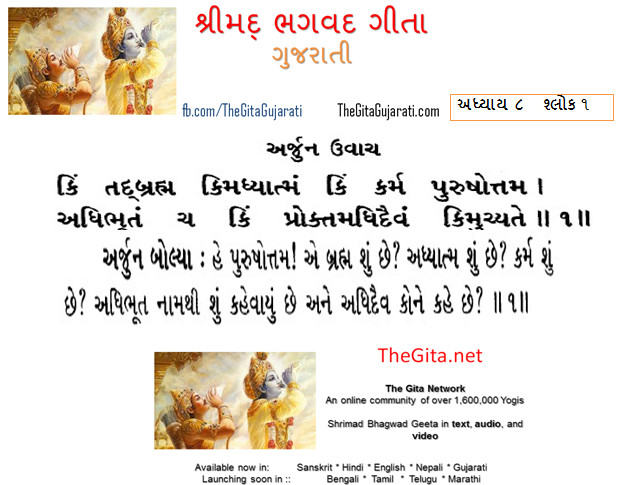
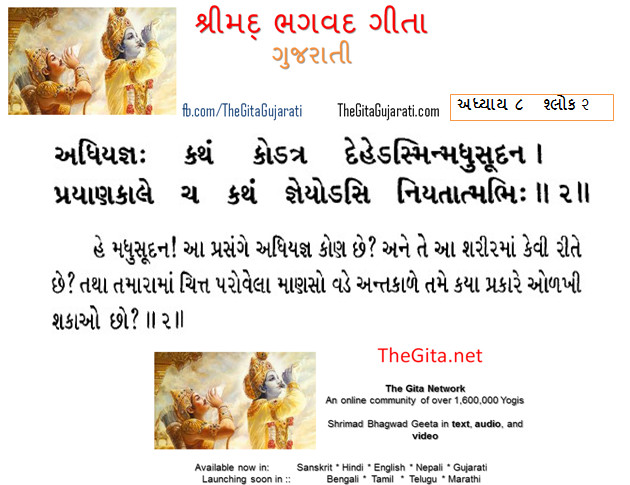
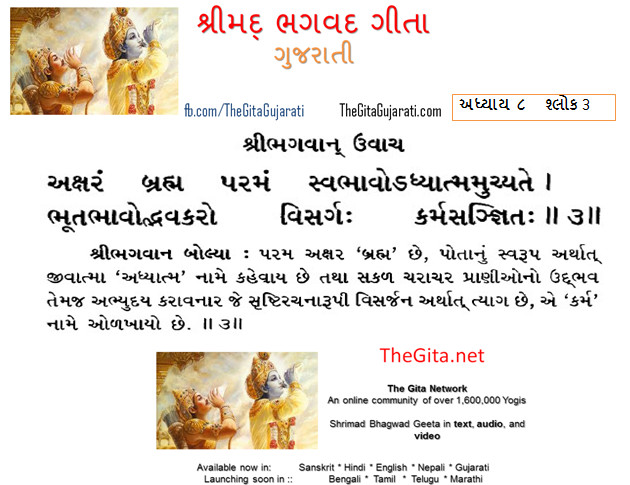
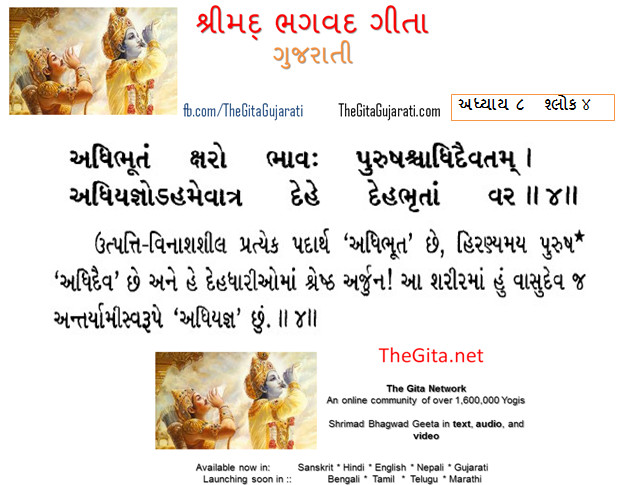
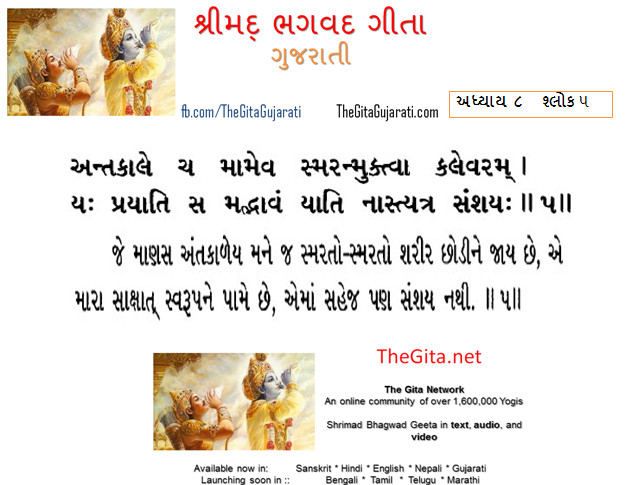
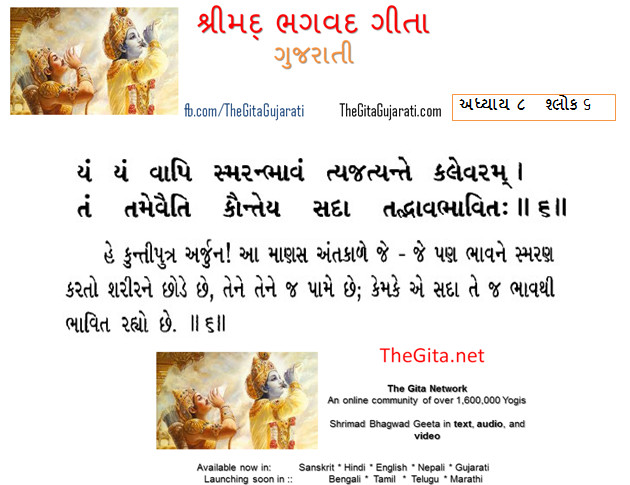
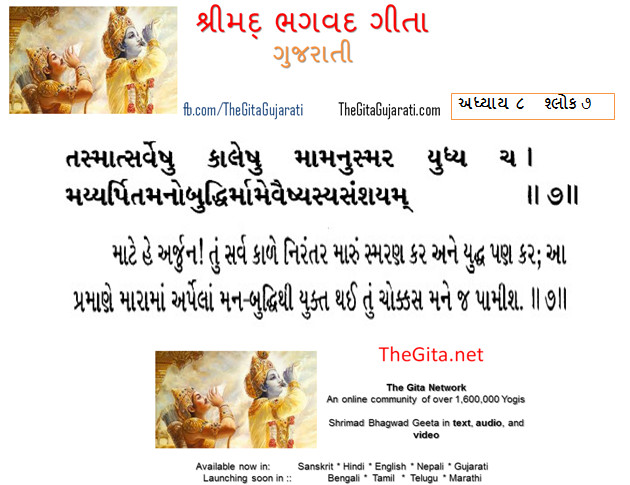
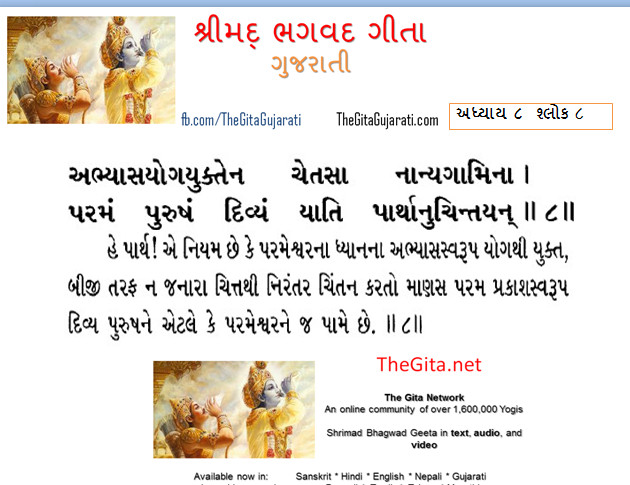
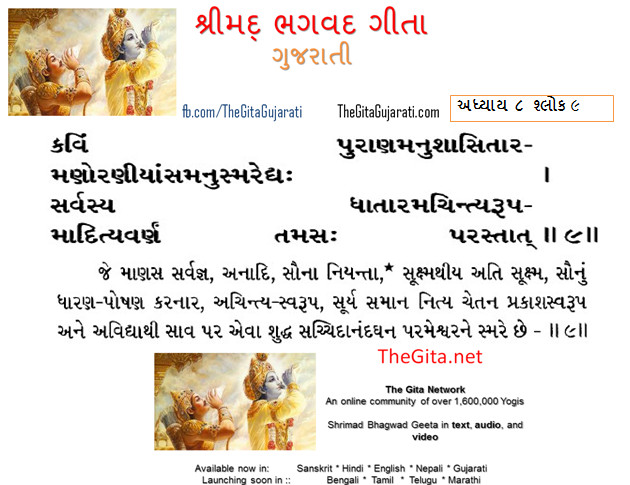
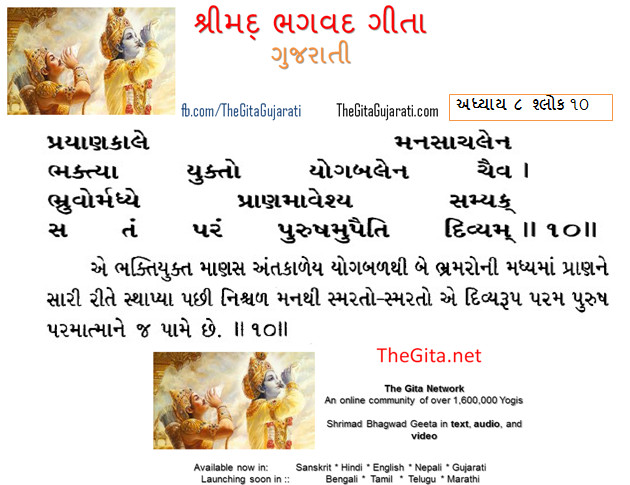
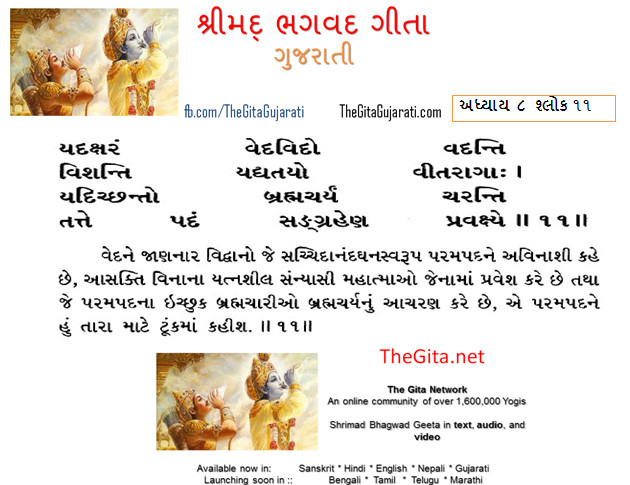
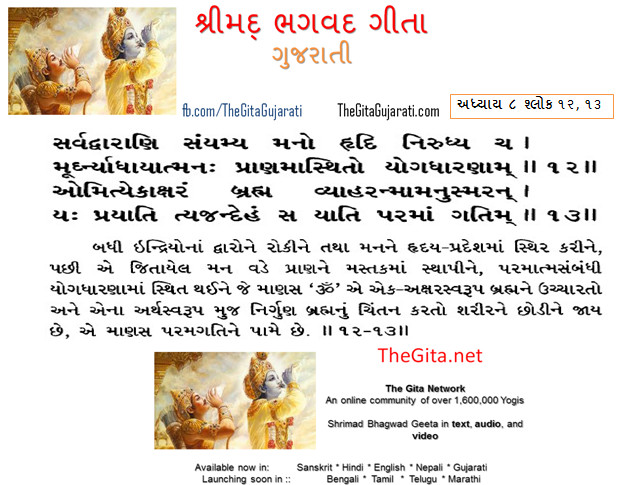
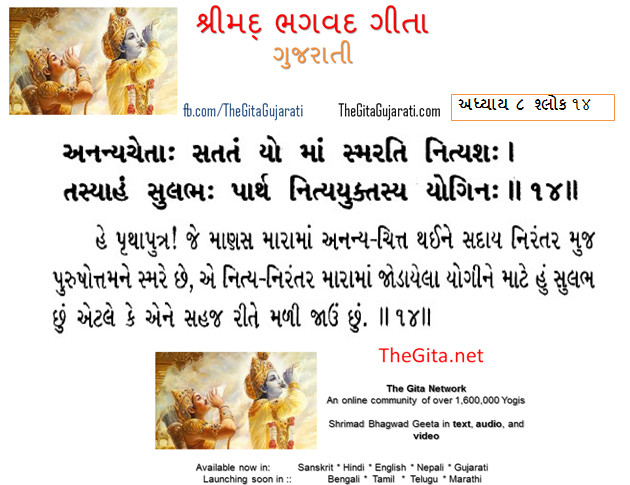
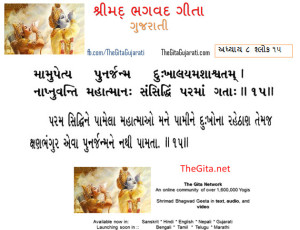
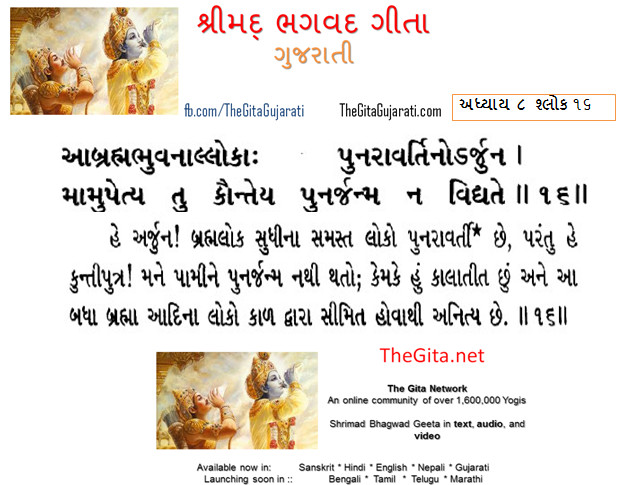
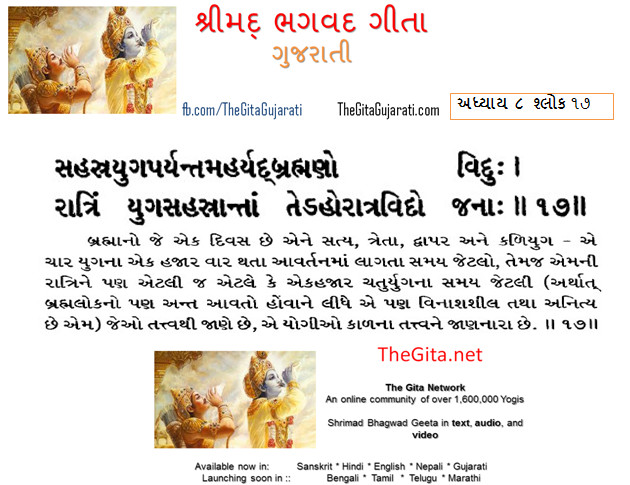
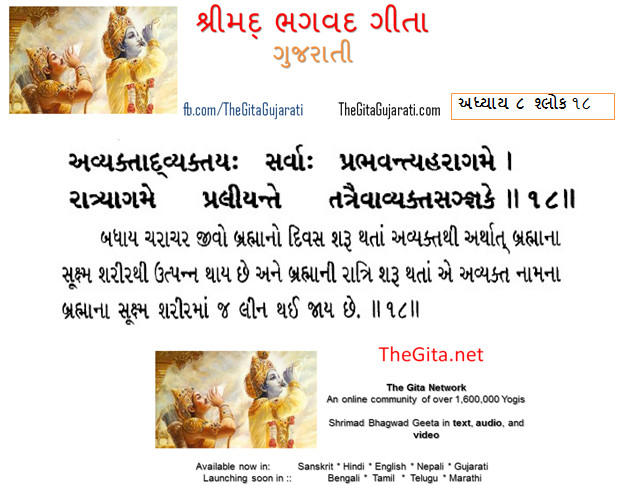
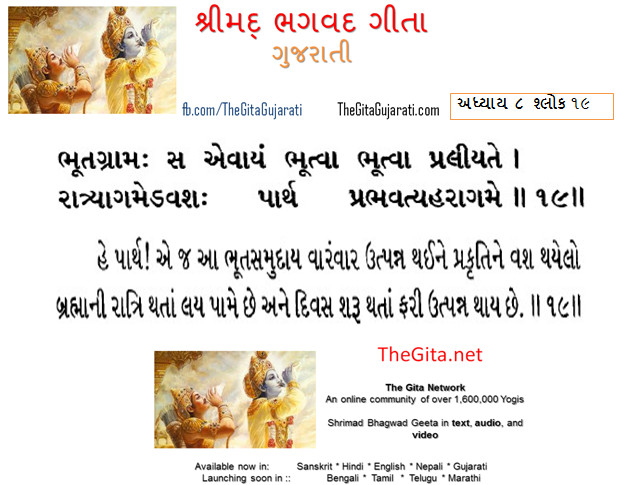
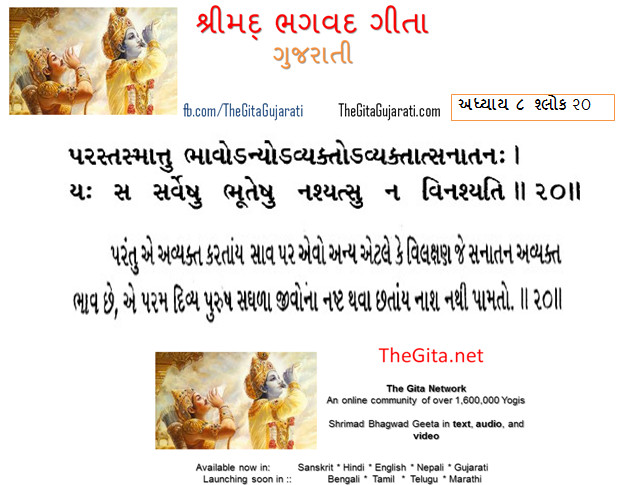
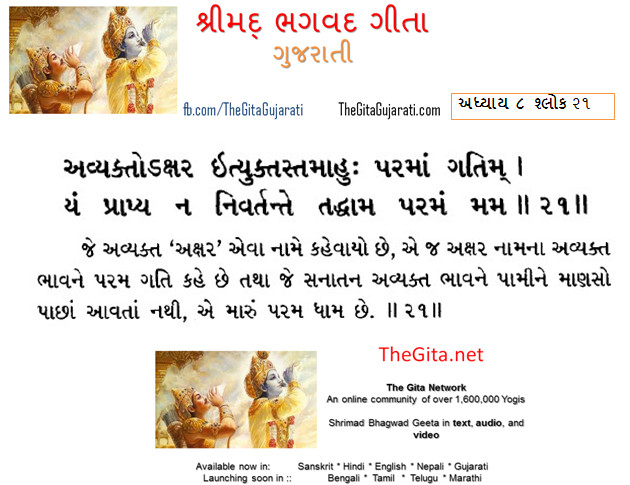
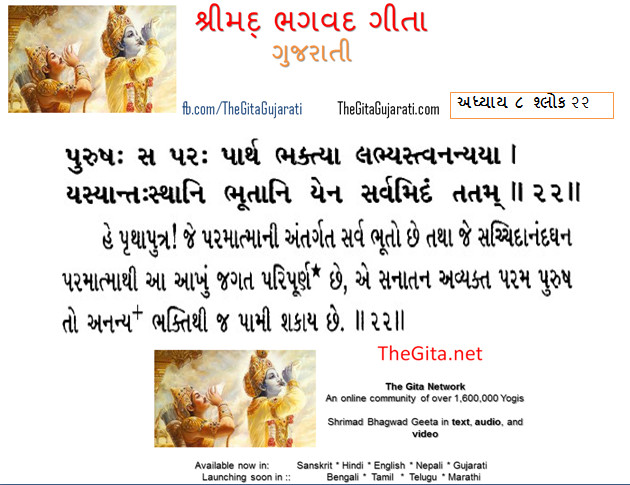
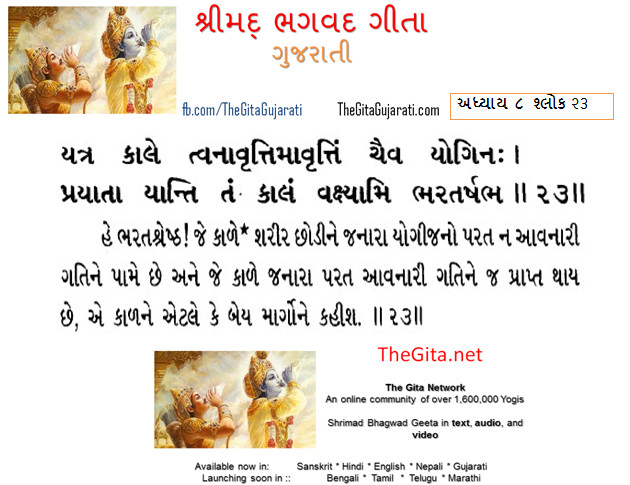
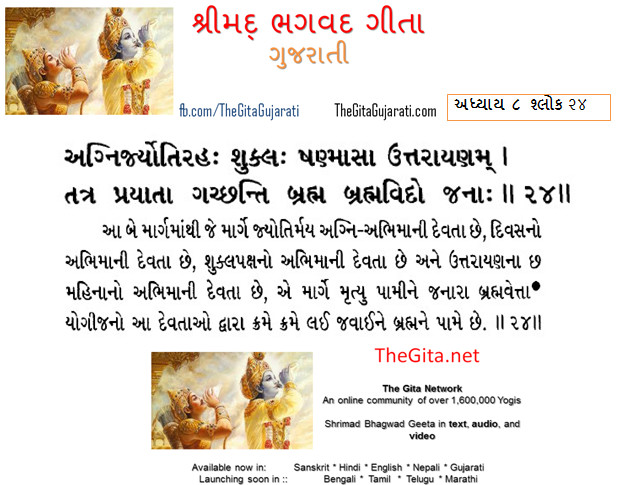
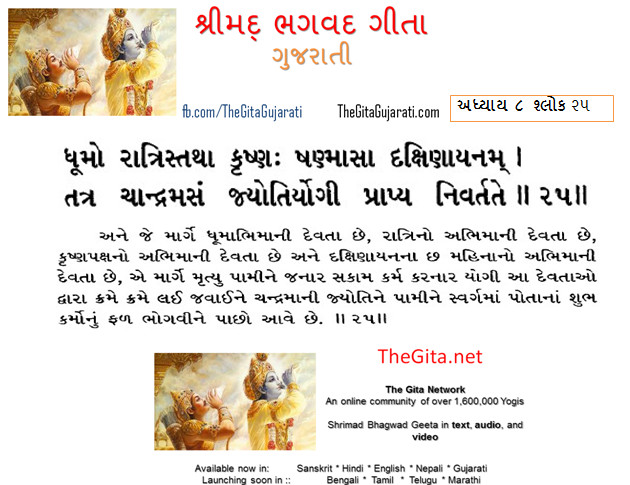
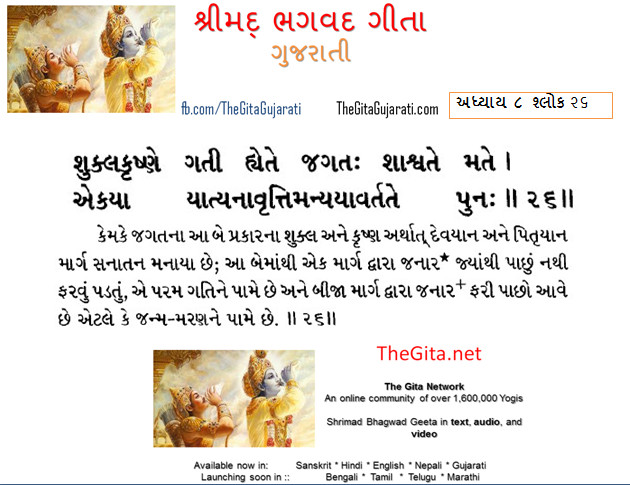
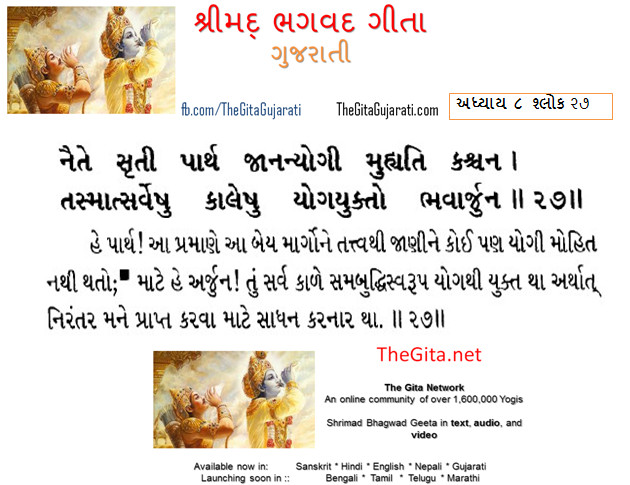
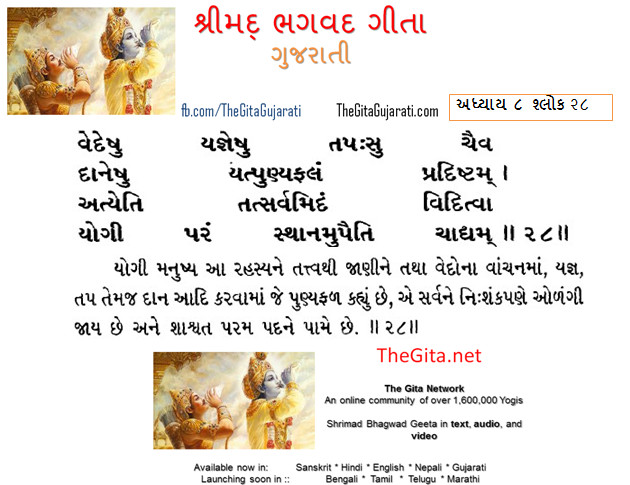
Pingback: અધ્યાય-૭-ગીતા ગુજરાતી | The Gita - Gujarati